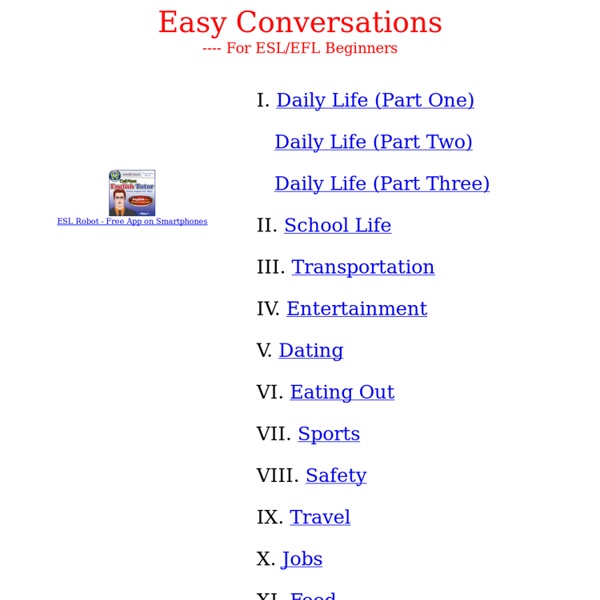



Listening Welcome to EnglishClub Listening, to help you learn the skill of listening in English. Listening is the first of the four language skills, which are: 1. Listening 2. Speaking 3. What Is Listening? How to Hear English Everywhere How can you hear English when you're not in an English-speaking country? Dictation Do you want to improve your English listening skills? Listen to English by Radio Listen to English online with programmes from stations like the BBC or Voice of America. Listen to the News Listen to our weekly digest of the news in English. Listen to Poetry in English Some classic pieces of poetry and other texts for you to listen to and read. Podcasts You can listen online or download these readings, many of which come with transcript and wordchecker to explain vocabulary. Improve your listening with MyEC! MyEnglishClub features thousands of videos and songs for English learners. This Week in History Listen to a new story every Monday. ESL Videos More listening practice by watching videos.
ReadAnyBook.com – online reading for free. BBC Learning English | Prononciation Conseils If You Love To Read Emmy and Willy, who sit next to each other, were doing something on their laps - passing something back and forth, I think: I couldn't see what. Willy was giggling, though. Bubby played with her food. “It's too bad no one will ever read all the great novels Libby's written on the dining-room table,” he said (he knows I want to be a writer when I grow up - everyone who knows me knows that!). I didn't. Finally, he said he would tell us the news. “We're moving to England for six months. He said that he would go first, and my mother would bring us over on an ocean liner, and he'd find a place for us to live in London and a school for Emmy and me - and maybe Willy, too. I was still trying to imagine an ocean liner. “Will we be on the ship for a long time? “Five nights. "Like Libby!” “Liberté is French for Liberty. He talked about ocean liners for a long time: I pictured wind and ladies in long dresses going up the gangplank and the sound of a foghorn.
Present Simple & Present Progressive: présent simple et présent progressif ou continu Notes Notez le 's' à la troisième personne du singulier du 'Present Simple'.Avant d'ajouter -ing, il faut doubler la consonne finale si les deux conditions suivantes sont remplies: le verbe se termine par une seule voyelle suivie d'une seule consonne,la dernière syllabe est accentuée, ou il n'y a qu'une syllabe. Pour savoir si la syllabe est accentuée, il faut consulter un dictionnaire. Emploi Present Progressive Le Present Progressive (ou Present Continuous) s'emploie pour parler de: ce qui se passe maintenant: I'm reading a page on the Internet at the moment. Present Simple Le Present Simple s'emploie pour parler de: ce qui est toujours vrai: The sun rises in the east. Le Present Simple est aussi employé pour les verbes d'état, c'est-à-dire les verbes qui font référence à un état mental, émotionnel, etc. Il est à noter pourtant que certains de ces verbes peuvent avoir une signification autre que celle qu'ils ont lorsqu'ils sont considérés comme des verbes d'état. Pratique
Great books for ESL students (40) Présent simple - What time do you wake up? - I wake up at 9.30 am Principaux emplois : vérités permanentes, actions répétitives/habituelles; sentiments Syntaxe : Ajoutez un -S à la 3ème personne du singulier. Si le verbe se termine par un -y précédé d'une consonne, le -y se change en -ies Exemple (verbe : to wake up / se réveiller): I wake up You wake up He/She/It wakeS up We wake up You wake up They wake up Négation : Utilisez les auxiliaires DON'T ou DOESN'T (3ème forme du singulier) I don't wake up at 9.30 am She doesn't wake up at 9.30 am Le 's' de la 3e personne du singulier vient se greffer à l'auxiliaire DO, pas au verbe. Question : Utilisez DO ou DOES (3ème forme du singulier) Do you wake up at 9.30? Le 's' de la 3e personne du singulier vient se greffer à l'auxiliaire DO, pas au verbe. Réponses : Do you wake up at 9.30 ? EXERCICE: Mettre les verbes au présent simple
Best Young Adult Novels, Best Teen Fiction, Top 100 Teen Novels It's almost a cliche at this point to say that teen fiction isn't just for teens anymore. Just last year, the Association of American Publishers ranked Children's/Young Adult books as the single fastest-growing publishing category. Which is why we were only a little surprised to see the tremendous response that came in for this summer's Best-Ever Teen Fiction poll. And now, the final results are in. Selecting a manageable voting roster from among the more than 1,200 nominations that came in from readers wasn't easy, and we were happy to be able to rely on such an experienced panel of judges. Summer, like youth, is fleeting.